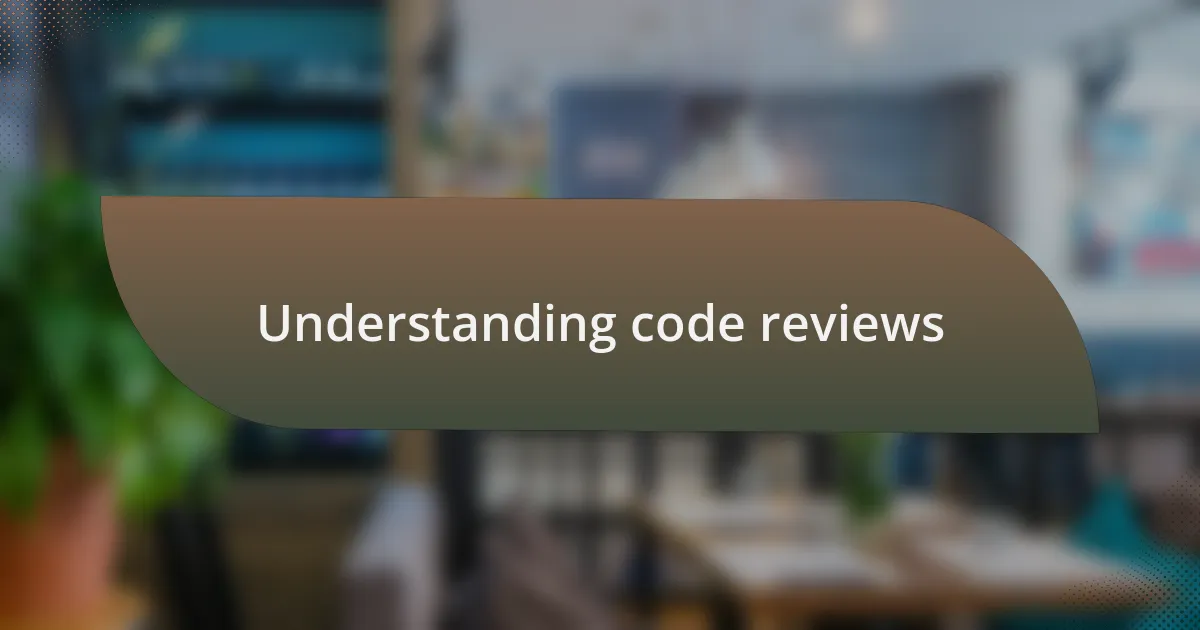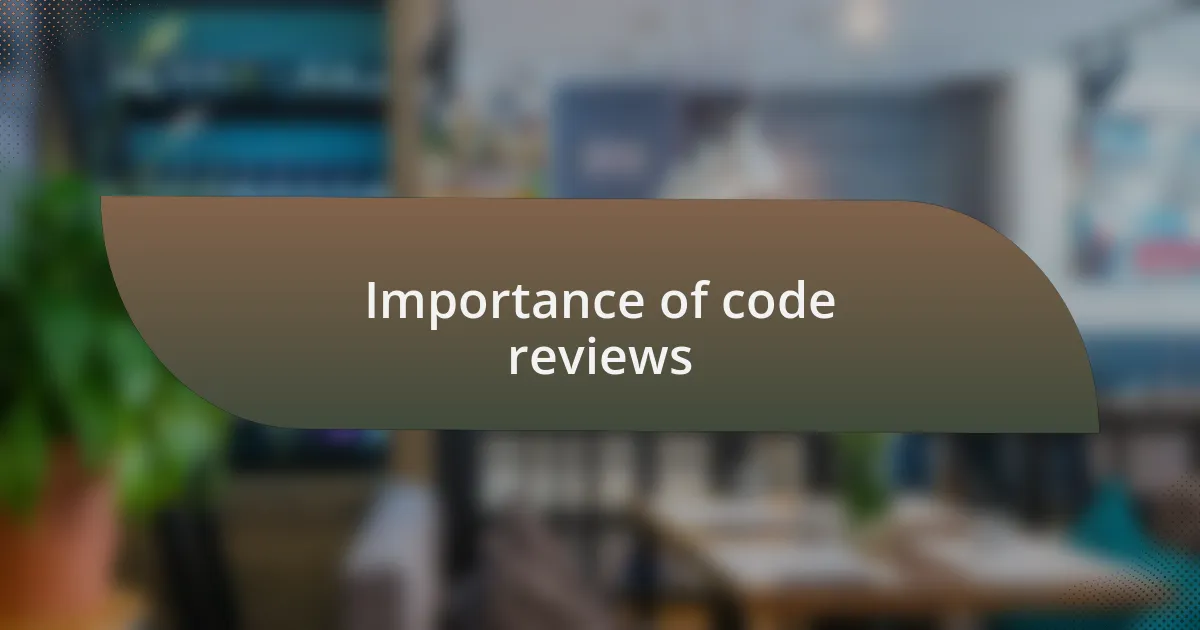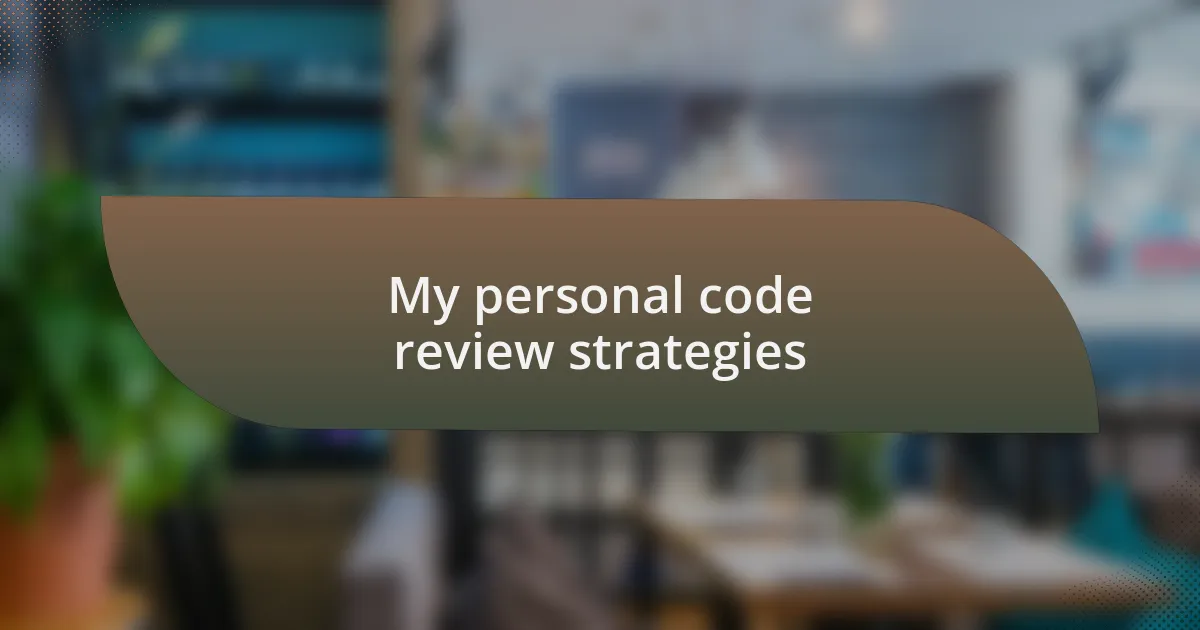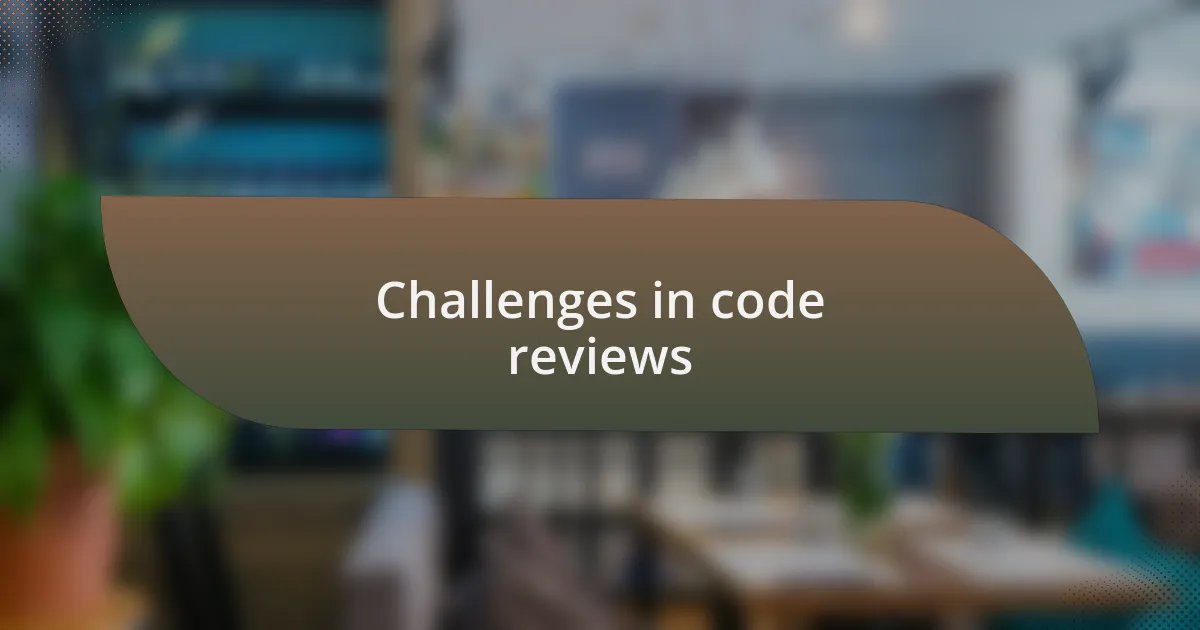Key takeaways:
- Code reviews enhance code quality and foster collaboration, serving as valuable learning opportunities for developers.
- Establishing clear guidelines and a respectful atmosphere during code reviews promotes constructive feedback and team cohesion.
- Utilizing the right tools, such as CI systems and dedicated review platforms, can streamline the review process and improve communication.
- Recognizing challenges such as personal biases and information overload is essential for maintaining effective and objective reviews.

Understanding code reviews
Code reviews serve as an essential checkpoint in the software development process, fostering collaboration and enhancing code quality. From my experience, I’ve found that engaging in these reviews not only highlights potential bugs but also opens the door for knowledge sharing. Have you ever faced a colleague’s perspective that completely changed how you viewed a problem? It’s those moments that truly amplify the value of code reviews.
In my early days as a developer, I often viewed code reviews as a punitive measure—an opportunity for someone to critique my work. However, I’ve come to appreciate that they are, in fact, a valuable learning opportunity. When another developer offers feedback, it’s a chance to reflect and grow. Does it ever feel like a light bulb moment when someone points out a nuance you overlooked? That’s the magic of collaborative coding.
The emotional impact of code reviews can be profound, often building a sense of community among team members. I distinctly remember a time when a peer expressed gratitude for our review session, stating it strengthened their confidence in writing code. This interaction made me realize that code reviews can foster not just better code but also more cohesive teams. How often do we share this kind of emotional connection through technical discussions? For me, it underscores the human side of software development that is so often overlooked.

Importance of code reviews
Code reviews are crucial for elevating the quality of software. During a recent project, I encountered a particularly complex piece of code that seemed fine to me at first glance. However, after my peers reviewed it, they uncovered logical flaws I had missed. Doesn’t it make you wonder how often we overlook potential issues simply because we’re too close to our work?
I’ve also noticed that code reviews can serve as a fantastic bonding experience among developers. I once participated in a session where the atmosphere was so relaxed and open that we found ourselves sharing coding tips that weren’t necessarily related to the current review. Isn’t it uplifting when a simple review transforms into a learning session where everyone leaves with new insights? It’s moments like these that foster a collaborative spirit and contribute to personal growth.
Moreover, I believe code reviews can act as a safety net, preventing larger issues down the road. There was a time when my oversight led to a significant bug that ebbed into production, but a colleague’s attentive review caught it just in time. How relieved did I feel knowing that their keen eye saved us from headaches? This reinforces my belief that regular code reviews can not only improve individual skills but also lead to more stable, reliable applications.

Best practices for code reviews
When it comes to code reviews, establishing clear guidelines for what to focus on can make all the difference. I remember a time when my team outlined specific criteria, like readability, efficiency, and adherence to our coding standards. This helped steer our discussions, ensuring that we didn’t just skim the surface but instead delved deeper into areas needing attention. How much time do you spend on ensuring everyone knows where to direct their focus?
Another effective practice I’ve adopted is the “two-reviewer” rule, which not only diversifies perspectives but also strengthens the review process. In one project, I found that having a fresh set of eyes on the code led to insights I would have never considered. It turned into a sort of collaborative puzzle-solving session, where different viewpoints enhanced the quality of our work. Have you ever felt that a second opinion truly elevated a project’s outcome?
Lastly, fostering a respectful and constructive atmosphere during reviews cannot be overstated. I’ve experienced reviews that felt more like confrontations than collaborations, which only stifled creativity and learning. By encouraging positivity and acknowledging good practices alongside suggestions for improvement, I noticed a significant boost in morale and willingness to participate. After all, isn’t it easier to grow when we’re encouraged rather than critiqued?

Tools for effective code reviews
Choosing the right tools for code reviews is crucial to maximize efficiency and collaboration. For instance, I’ve found that using platforms like GitHub or Bitbucket to manage pull requests makes the whole process smoother. It’s astonishing how features like inline comments can clarify misunderstandings instantly—have you ever hoped for a way to address feedback directly in the context of the code?
In my experience, integrating Continuous Integration (CI) tools like Travis CI or CircleCI has revolutionized our workflow. I recall a particular project where automating builds and tests allowed us to catch issues before they even reached the review phase. It really made our discussions more focused on the code quality itself rather than spending time on basic troubleshooting—doesn’t it feel empowering to have that level of automation at our fingertips?
Also, I emphasize the value of dedicated review tools like Review Board or Crucible. I remember a time my team transitioned to using Review Board, and it changed how we approached feedback. The capability to track changes effectively and have threaded conversations on specific lines made our reviews not just a formality but a meaningful dialogue about our code. Isn’t it gratifying when the tools we use enhance our ability to work together thoughtfully?

My personal code review strategies
When it comes to my personal code review strategies, I prioritize setting a clear agenda for each review session. I remember a time when I lacked structure, and it felt chaotic. By outlining specific goals for the review, I ensure we stay focused and make the most of our time together—haven’t you ever wished meetings could be more productive?
Another strategy that has worked wonders for me is rotating the responsibilities within the team. I noticed that by allowing different team members to take the lead during reviews, everyone gains a deeper understanding of the codebase. Plus, it fosters a sense of ownership and accountability—don’t you think it’s important for everyone to feel invested in the work?
Finally, I always push for a friendly, constructive atmosphere during code reviews. When I first started, I saw how harsh feedback could demoralize my teammates. By framing critiques as opportunities for growth and learning, I help nurture a culture where everyone feels comfortable sharing ideas—what better way to encourage creativity than by making sure everyone’s voice is heard?

Challenges in code reviews
One of the biggest challenges I’ve encountered in code reviews is when personal biases creep in. I recall a time when my affection for certain coding styles led me to overlook significant issues in a colleague’s work. This experience taught me that it’s vital to detach personal preferences from objective critiques. Have you ever found yourself favoring a friend’s code simply because you like the way they work? It can cloud your judgment.
Another hurdle I frequently face is the sheer volume of code being reviewed. There have been instances when I felt overwhelmed by the amount of information presented, making it difficult to focus on crucial areas that needed attention. I learned that breaking down the review into smaller, manageable sections not only enhances clarity but also allows for a more thorough analysis—what methods have you tried to tackle information overload?
Finally, communication barriers can turn a straightforward review into a frustrating ordeal. I remember a review session where technical jargon flew around, but not everyone understood. This reinforced the importance of clear language when providing feedback. Have you experienced moments of confusion during a peer review? By choosing simpler terms and encouraging questions, I strive to eliminate confusion—after all, effective communication is key to successful collaboration in our field.